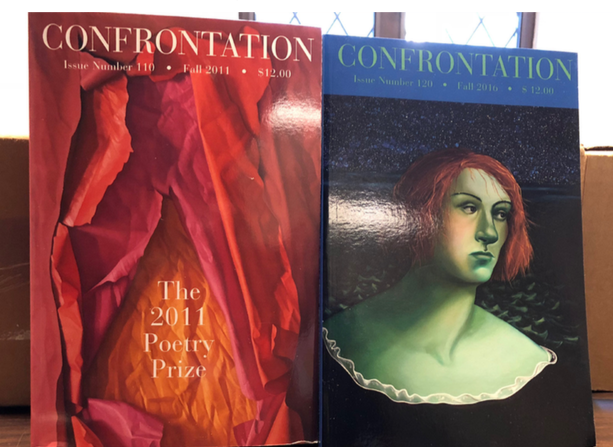By Justin Simon
Assistant News Editor
“Great literature is simply language charged with meaning to the utmost possible degree.”
– Ezra Pound, American poet and critic
“Confrontation,” an American literary magazine run by the English department, did not receive funding for this semester. The literary magazine served as a creative backbone for the English department for 50 years, publishing two editions each year. Professional writers from around the world contributed to the publication with fictional short stories, essays and poems.
Although no official announcement has been made about the future of “Confrontation,” money has not been allocated in the budget for its printing and other expenses. Dr. Jonna Semeiks, an English professor, served as the literary magazine’s editor-in-chief for eight years. Before then, she was the associate editor and fiction editor. Having worked on magazine for 18 years, Semeiks is sorry to witness the magazine’s demise.
Semeiks’ role allowed the evolution and advancement of “Confrontation,” on a yearly basis. “After I became editor, we began publishing visual art in every single issue,” Semeiks said. “As fiction would naturally call for both technical and substantial modifications, I would work with each writer to improve their work.”
“Confrontation” was founded in 1968, by Martin Tucker, a retired professor of English and a poet. Although the magazine started at LIU Brooklyn, Tucker brought the magazine with him to the Post campus. The magazine has a rich history of contributors. Notable writers include W.H. Auden, John Steinbeck, Derek Walcott and Isaac Bashevis Singer. The magazine has also helped launch the careers of Walter Abish, Cynthia Ozick and Paul Theroux.

Semeiks believes the magazine will be missed. “It really is a shame, the quality of writing is fantastic and I am proud of every contribution collected over the years,” she said. “I think there is a place for a literary magazine at a university. Whether they are big or small, rich or poor, public or private, they have literary magazines.”
Dr. John Lutz, English professor and director of the English department, said there is an unfortunate lack of support from the administration. “There was an outlay of a stipend and they have decided that the cost was not worth the return,” Lutz said.
While the administration has not offered a reason for the termination of “Confrontation,” Lutz came to the conclusion that money was the ultimate deciding factor. “While a literary magazine would not supply a return in dollars, it provides people with a means of expression and certainly has a place in our university,” he said.
From a humanitarian standpoint, Dr. Lutz believes the magazine offers something more significant than monetary profit. “Not everything in an educational institution is going to provide some kind of financial return,” he said. “There are other kinds of values that we subscribe to with educational expenses that are worthwhile.”
Lutz argued that literature is essential when expanding one’s own perspective. “I defend literature as a practical skill, as a skill that is able to develop our empathy,” he said. “You study poetry and stories to encounter other perspectives and find oneself. Without it, our ability to cultivate that empathy is diminished. It is not something that appears on a financial spreadsheet, but as something that has a value and a place at an educational institution.”
Copies of previous issues of “Confrontation” can be found in the archives at the campus library.





Be First to Comment